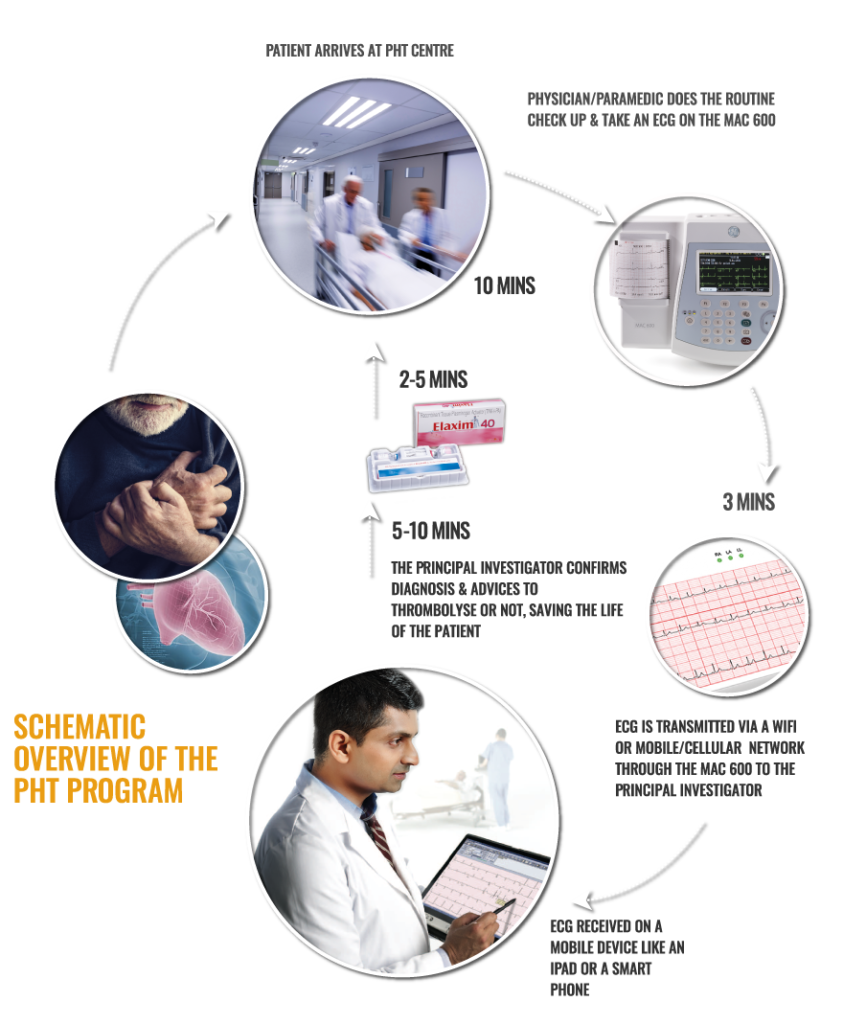Heart attack Emergency Assuaged by Remote diagnosis and local Treatment
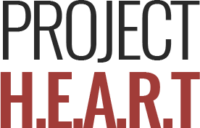
Heart attack Emergency Assuaged by Remote diagnosis and local Treatment
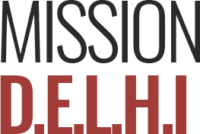
Delhi Emergency Life Heart-Attack Initiative
The Indian Council of Medical Research (ICMR) launched ‘Mission DELHI’, an emergency medical service, as part of which a motorbike-borne assistance unit can be quickly summoned for a person suffering from a heart attack or chest pain. The pilot project has been launched in a radius of three kilometres around the All India Institute of Medical Sciences (AIIMS).
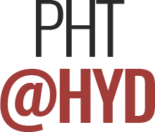
A Pre-Hospital Thrombolysis Project launched in Hyderabad, to treat indication of AMI (Acute Myocardial Infarction).
Mission DELHI is all about making health care available to heart attack patients in the Golden Hour and Elaxim could be key to making his program a success.
Gennova Biopharmaceuticals Ltd. has established a collaboration with GE Healthcare and to implement a Pre‐Hospital Thrombolysis (PHT) program across India. The impetus and driving force for the innovative PHT program comes from two important issues pertinent to India. The first is that the availability and implementation of a US standard 911‐ type emergency system is extremely limited as is the number of CATH labs (catheterization laboratory) for a country with such a large population. In other words, there is a limited opportunity for the AMI (acute myocardial infarction) patient to receive emergency care at their residence and it is unlikely that there is a nearby CATH lab for emergency primary catheterization. The second is that given the issues with inaccessible emergency transport and extreme traffic density, it is no surprise that the median symptom-to‐door time was 300 minutes for Indian patients with ST‐segment elevation myocardial infarctions (STEMI)1, well beyond the prescribed “Golden Hour” for reperfusion treatment. Lack of evidence‐based care has also been cited as a major reason for high mortality rates from CVD in India.
To address this extremely challenging scenario, Gennova and GE conducted the pilot PHT program in association with leading cardiologist from Hyderabad, connecting to nine primary care facilities without primary percutaneous coronary intervention (PCI) capabilities, that are remotely located and do not have access to either a cardiologist or a CATH lab or both. This pilot program utilized GE’s portable electrocardiogram (ECG) device, MAC 800 resting ECG analysis system, which were installed in these primary care facilities. MAC 800 generates an electronically transmitted report for a cardiologist at the CATH lab located in Hyderabad. The cardiologist opines on the cardiogram and instructs the general practitioner at the primary care facilities to thrombolyse with Elaxim™, if required. This in turn allows the patient who may be suffering from a life‐threatening STEMI event to be diagnosed and treated with Elaxim™ within the critical 90 minute of the heart attack – long before arriving at the emergency room or CATH lab.
207 patients presenting with STEMI were diagnosed and treated with an average time from initial diagnosis (ECG) to Elaxim™ treatment of less than 25 minutes. The pilot PHT program (Phase I) has been completed and a manuscript is in preparation for submission in a peer‐reviewed scientific journal. Development plans are already underway in consultation with the Indian Council of Medical Research (ICMR) for the Phase II program which will encompass 25 centers (nursing home‐based as well as ambulance‐based) across India. This study is expected to take approximately 1.5 years to complete. Once these two phases are concluded, with GE’s support, Gennova intends to expand the PHT program to 500 centers across India.
1 Xavier D, Pais P, Devereaux PJ, Xie C, Prabhakaran D et al. CREATE registry investigators. Treatment and outcomes of acute coronary syndromes in India (CREATE): a prospective analysis of registry data. Lancet 2008; 371(9622):1435-42.
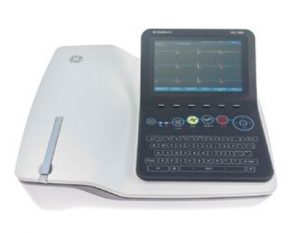
Elaxim™ is the brand name of Gennova’s biosimilar of the third generation thrombolyte Tenecteplase, which is a modified version of natural tissue plasminogen activator. Elaxim™ is indicated for use in the reduction of mortality associated with acute myocardial infarction (AMI). Elaxim™ was launched in 2007 in three different strengths (Elaxim 30mg, Elaxim-40mg and Elaxim-52.5mg) for single intravenous (IV) bolus administration.
MAC 600 is a handheld ECG device that can be operated in field and in centres without the need of an electrical connection. The MAC 2000 is an advanced ECG analysis system that also can give a full page ECG printout ideal for a patient report. On request from Gennova, GE Healthcare installed data portability capabilities in the MAC 600/2000 such that the cardiogram can be digitally transferred to a remote MuSE server maintained by GE. From the server the data can be circulated to a smart-phone/email of the cardiologist. The server also has a database of innumerable STEMI cardiogram which enables a software to predict STEMI from the ECG report as an added aid to the cardiologist.
